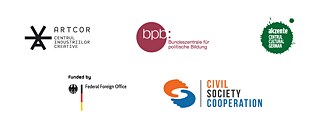3+3 ≠ 6 in South Caucasus
This article was produced in the framework of the "Unprejudiced" project with the support of the Eastern Partnership Programme and the German Federal Foreign Office in January 2022.
Authors:
Aysel Azizova
Aida Hovhannisyan
Ketevan Khutsishvili
Introduction
On October 6th Russian foreign minister Sergey Lavrov announced that Moscow was suggesting the creation of a new format that would include Russia, Turkey and Iran, along with 3 South Caucasian nations: Armenia, Azerbaijan and Georgia. According to Lavrov the format would address the issues of security and economic and transport ties between these countries. The announcement was made after the meeting with his Iranian counterpart Hossein Amir-Abdoullahian. Lavrov stated that Iran, Turkey and Azerbaijan welcome the initiative and Russia was going to work with Armenian colleagues. As for Georgia, according to the Russian foreign minister, they hoped that “despite all the problems it is experiencing” they would be able to see an interest in this project from the Georgian side. A week before the meeting between the ministers of foreign affairs, Turkish President Recep Tayyip Erdoğan met with Russian president Vladimir Putin in Sochi. One of the topics of discussion was the 6-nation format which, according to Erdoğan, Putin was ready to create.
The idea of creating such a format is not new and has been floated since the end of the Karabakh war in November 2020. In December of that year presidents of Turkey and Azerbaijan spoke of creating a new regional format involving 6 countries. The idea was proposed again in January 2021 after the meeting of Turkish and Iranian foreign ministers. Mevlüt Çavuşoğlu mentioned that the idea had support not only from Azerbaijan, but also from Russian president Vladimir Putin. Javad Zarif, who was at that time touring South Caucasus, stated that the format would include activities to develop the region, specifically cooperation on the topics of highways and railways as well as energy.
The reception of this idea was not as enthusiastic in other countries, specifically Georgia and Armenia. The reasons are different, but the general scepticism towards the format comes from the fact that there are tensions between the potential members that would be hard to overcome to reach any meaningful outcome. It should be mentioned that Armenia does not have diplomatic relations with Azerbaijan and Turkey due to the Nagorno Karabakh conflict and the same is true for Georgia and Russia. In this case diplomatic ties were severed after the Russo-Georgian war in 2008 followed by the occupation of 20% Georgian territory and Moscow's recognition of the independence of Abkhazia and Tskhinvali regions.
This article aims to examine the attitude towards the project in three South Caucasian countries and look closer at the reasons for their support or resistance towards the idea of creating a format with 3 major regional powers with their own interests in the South Caucasus and to analyse what this format might mean to the security of the region in general.
The government of Azerbaijan is supporting the project, but the opinion within the country is not uniform
The president of Azerbaijan Ilham Aliyev has confirmed his support for the 3+3 format numerous times. In his interview with CNN in August 2021, he said “I have repeatedly discussed this issue with my dear brother, President Recep Tayyip Erdogan, and our positions coincide. We support this format and hope that other countries join it too. I know that the Georgian side is not ready for that because there are no diplomatic relations between Georgia and Russia. This is the position of Georgia, and we must respect this position. Nevertheless, the relations between countries of the region are very important for regional cooperation, for stability, and for reducing the risk of future war to zero”.
President Aliyev added that specific projects, such as the opening of the Zangezur corridor, connecting Azerbaijan with Nakhichevan, which will go through Armenian territory and other roads could be discussed within the format.
The official position of Baku is in contrast with 2008, when Erdogan proposed the creation of Caucasus Stability and Cooperation platform. Apparently the enthusiasm towards regional projects suggested by Turkey have increased since the Second Karabakh war and deepening relationships between two countries.
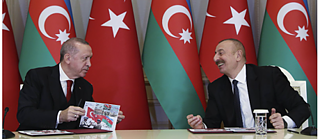
But the opinion on the 3+3 format and its benefits is not uniform in Azerbaijan. Azer Gasimli, a politician and former member of the Real Party in Azerbaijan thinks realizing the 3+3 format is not possible. Firstly, it will not be a 3+3 format because Georgia has declared that they will not be part of this.
According to Azer Gasimli, in this matter the government’s and the state’s interests are different. According to him as the authoritarian tendencies have increased in the region the 3+3 format is aimed at keeping the West away from South Caucasus:
Despite the main argument on the advantages of the format is the economic benefit, Azer Gasimli does not think that there is an economic benefit and moreover it will halter the development of Azerbaijan’s society:
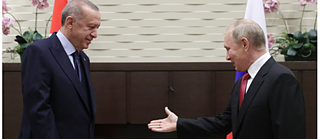
The Reasons behind hesitation - Why Armenia sees the format as problematic
The issue of regional cooperation is included in the Armenian government’s action plan as an important provision and from the very beginning Armenia has been interested in the opportunities of regional cooperation, the problem is just in the nuances, Prime Minister Nikol Pashinyan said in an interview to Public TV, commenting on the possible 3+3 format of regional cooperation. During his press conference on 23th of November, the Prime Minister announced that Armenia will not discuss the settlement of the Nagorno-Karabakh conflict in the ‘3+3’ format since there is already the format of Co-Chairmanship of the OSCE Minsk Group.
In which case the Government of Armenia is going to be part of this format? According to the minister of Foreign Affairs, Ararat Mirzoyan, Armenia considers that any measure of regional cooperation can be effective if it meets the following requirements:
• The format must be complete and inclusive.
• It should be based on the developments of positive tendencies in relations among all the states involved. Otherwise, it may lead to the transfer of the existing issues in the bilateral relations of the states to the multilateral format, which, in its turn, may lead to the disruption of both multilateral format and the bilateral dialogue.
Within the framework of Armenian experts they are sceptical about this initiative of the Turkish President. The political scientist Alexander Iskandaryan thinks that the format «3+3» will not be held; it is just an attempt by Turkey to enter the region in the diplomatic sphere. According to him, a format in which Georgia and Russia, Iran and Turkey, Armenia and Azerbaijan are present at the same time cannot work, that is, it cannot be a real working format. According to the analyst, the issues facing Armenia emerged after Turkey truly entered the region after the second war in Nagorno-Karabakh, that is, it became politically present in Azerbaijan’s security sector. The expert notes:
Ruben Safrastyan thinks that the 3+3 format is one of the steps through which Turkey is trying to strengthen its influence in the South Caucasus and it can only be done on account of the influence of Russia, so this format is not in Russian interests.
At the same time the experts are sure that this format is unlikely to turn into reality as Georgia has clearly stated its opposition, and without Georgia the format 3+2 makes no sense. It turns out that Turkey, Russia and Iran should be mediators between Armenia and Azerbaijan for which it has already operated the format of Minsk Group. Moreover, it is clear that cooperation between South Caucasian nations does not necessarily require the existence of the format.
There already can be found an example of Armenia and Azerbaijan reaching an agreement with the mediation of the West. In December a meeting between Presidents Nikol Pashinyan and Ilham Aliyev was held in Brussels with EU council president Charles Michel hostin it. According to Pashinyan the agreement to reopen the railway was re-established. He also mentioned the reopening of the roads between two countries.
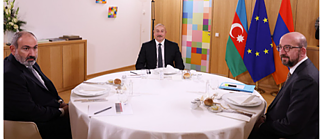
On December 10th first meeting under 3+3 format was held in Moscow. Even though Georgia did not attend the meeting, it’s flag was present and the Russian foreign ministry stated that the door remained open for official Tbilisi to join the format. The reason why despite the refusal from the Georgian government on joining the format the initiators, namely Russia and Turkey still express the hope that this decision might be reconsidered can be found in the mixed messages that the Georgian government officials have been sending.
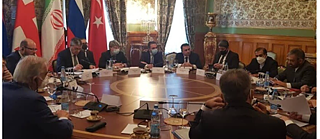
And on October 7, 2021 Georgian Foreign minister David Zalkaliani said in an interview, that “Georgia should at least in some form participate in the 3+3 platform, so as not to lose its position in the region, despite the fact that it will be very difficult to cooperate with Russia”. He added that sovereignty and territorial integrity of our country is the red line, but given the fact, that this red line had already been crossed by Russia, even the slightest suggestion of participating in the format caused backlash on traditional and social media, coming from Georgian citizens, experts, opposition and Georgia’s friends abroad, which prompted Ministry of foreign affairs to make an explanation and claim that ministers words were misinterpreted and Zalkaliani did not say that Georgia would participate in this format. The Ministry reiterated that Georgia was not considering joining the 3+3 platform.
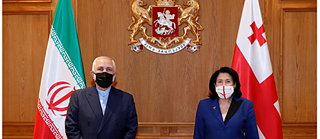
The Russian ministry of foreing affairs also responded to Zalkaliani’s comment. The spokesperson of the ministry Maria Zakharova said that statements from Georgia are contradictory, but Russian media frequently mentions comments made by Georgian foreign ministers as an indication that after all Georgia might consider joining the platform.
Among the first to draw the attention to the Minister's ambiguous statement and criticize it was Zurab Batashvili, researcher at Georgian foundation of Strategic and International Studies. He believes that foreign minister’s comments were testing the waters to see how the Georgian public would receive the idea of considering joining the 3+3 format.
With general public opinion being against the format, there still are small groups who voice their support toward the initiative. One of the proponents of the 3+3 format is Alt-info, a platform connected to Georgian businessman Levan Vasadze and his new political party “ERI”, with close ties to one of the Kremlin ideologues Alexander Dugin. Founders and hosts of Alt-Info were among the organizers of July 5th violence in Tbilisi, where dozens of journalists were violently attacked and injured, followed by the death of one of the Cameramen, Levan Lashkarava. Recently Alt-info founded its own political party called “Conservative Movement” declaring that they are ready to start direct dialogue and cooperation with Russia. Even though Alt-Info has regularly displayed Anti-Turkish and Islamophobic sentiments, lately fretting over the prospect of Georgia joining NATO, falsely claiming, that it would mean the creation of Turkish military bases in Georgia, when it comes to the 3+3 format, they do not seem to mind, that it was suggested by Turkish president, apparently being sure, that Russia will ballance Turkey. This amplifies suspicion in some, that the real interested party in this format is Russia, who has long wanted a regional format excluding Western powers and including Turkey and Iran, with whom the relations have been becoming closer and that are also under Western sanctions, thus representing potential allies against the US and EU.
While the opponents of the format point to the fact, that Russia is continuing the occupation of 20% of Georgian territory and borderization and refuse to join any format with Russia without the inclusion of Georgia’s western partners, supporters of the format argue, that Georgia should not be left out of the regional negotiations and potential transportation or other economic projects that might take place through this format, as it might be left out of important decisions. But the question here is what is Georgia to gain from these projects and even if the decision to join will be made, would its opinion matter against the big powers and their interests. Another issue is the trustworthiness of Russia, known for its total disregard towards the agreements and the use of any economic tools it has for exerting pressure to achieve its own goals.
As experts point out, Georgia already is in the center of many regional infrastructure and economic projects and can continue to do so without joining the 3+3 format. Batiashvili believes that even if this organization is formed, it will not be functional due to the tensions among the member states:
Threat of being left out - how should the West respond
One of the first to criticize the ambiguous statement from the Georgian government was former US ambassador to Georgia, Ian Kelly. Ambassador Kelly commented on Zalkalianis words that it would be very hard to cooperate with Russia: “Very hard? Russia invaded and occupied you. Your friends would rather hear you say “impossible” - he wrote on Twitter.
Since then several high profile visits were made to the region by US officials. US secretary of defence, Lloyd Austin visited Georgia in October and signed a memorandum on a new program in defence and security. Asked about the 3+3 initiative, he drew attention to Russian occupation and the need for Russia to respect the existing agreements, specifically the 2008 ceasefire agreement, before discussing new platforms.
In November Deputy assistant secretary of state Erika Olson who is overseeing the policy for Southern Europe and the Caucasus visited three South Caucasian countries. After the meeting, the Georgian foreign minister said that the United States is interested in creating a platform for three Caucasian nations, the platform for dialogue offered by Georgia to Armenia and Azerbaijan. This was seen by some as the US seeking new formats to counter the 3+3 initiative.
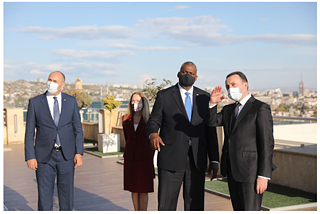
Conclusion - Whose interests are behind the format and what could it mean to the security of South Caucasus
It is clear that the experts in all three South Caucasian countries see the interests of big regional powers, Turkey, Russia and Iran behind the project. What is not clear is the concrete aims of the project and what it would actually bring to South Caucasian nations. It is also clear that the project would sideline the West and increase the influence of Russia, Turkey and Iran on the region. What is clear is the desire by these countries to increase their influence on the region, whether to prove to the West, that it has other alternatives, what might be the case of Turkey for proposing and supporting the project, to stay in the game of big politics and try to increase its influence in face of crippling Western sanctions, that might be the reason Iran’s for support and to draw together regional authoritarian players, leave the West out and consolidate its influence on the region that might be the aim of Russia.
Currently western attention is focused on the situation on Ukraine’s borders, where Russia is amassing its military equipment and forces and threatening an invasion if NATO does not declare that it will not accept Ukraine, and Georgia, as its members. But it should be clear that the 3+3 format is yet another example of the authoritarian regimes in the region trying to keep the west out and prevent the existence of working democracies in the region that could serve as a role-model and stir up democratic movements in their own countries.
As the experts point out, the realization of the project is questionable as the tensions between the potential member states increase from time to time and the perspectives of what the project should envelope differs from country to country and often contradicts each other. Moreover, it has also been pointed out both by local and international experts, that the cooperation between the 3 states in South Caucasus, Armenia, Azerbaijan and Georgia is possible without the involvement of regional powers with their own economic or security interests, which would only complicate the existing problems of communication.
